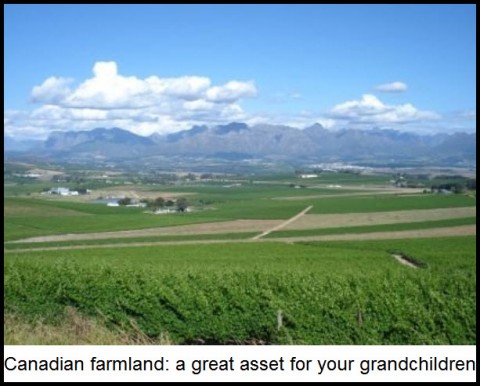[I alluded here earlier to a class of investable assets with the potential to grow in value more spectacularly, even, than gold or silver. In the guest commentary below, my friend Tom McCafferty, a commodity trader and author of numerous books, makes the case for Canadian farmland as the best place to sock away money for your grandchildren. Obviously, this would require more capital than you might sink into precious metals or stocks. But, as Tom puts it, if you’ve got “a couple of million” to spare, this is arguably a very good place to bury it. RA]
If you’re worried about the economy your children, grandchildren and even your great grandchildren will inherit, there is an investment that has the potential to help all three generations. It should even be rewarding in your life-time as well.
I’m talking about Canadian farmland. Not the beautiful mountains along the coasts, but the real, dirt farming, i.e. wheat, corn, oats, sunflowers, soybeans, sorghum, barley, etc., in the center of the country. But first things first: Why Canada?
- Global Warming—no matter whether it is caused by carbon dioxide or natural time cycles, the growing seasons in the higher climates is getting longer. The yield of prime exporting crops, such as corn and soybeans, are getting better as faster than the climate is rising.
- Water—Canada has plenty, unlike India and China. And it is clean water. Ever wonder why China put so much effort into controlling Tibet? The five major rivers that supply water to China originate in little old Tibet. When you read that China is importing more and more soybeans, they are actually importing water. And water, unlike oil, cannot be economically moved—imported or exported—from one country to another. It can only be used where it is. In the years to come, he who has water rules.
- Energy—Canada has oil, shale oil and natural gas—and plenty of it. And you sure cannot do much farming these days with gasoline (power) and natural gas (nitrogen fertilizer).
- Good farmland, priced right—Thousands and thousands of acres priced at a fourth of what you would have to pay in Iowa, for example. These acres are not equal to Iowa’s best land yet, but they will be in time. But on a return basis, they are in many ways the equal of Iowa now due to their lower price per acre and dollar return per bushel produced.
- Fertilized—it is home to one of the world largest fertilizer companies, which is one the largest producers and exporters.
- Politics—Canada is a stable country when measured against most standards. Its government is responsive to its citizens and would be one of the last in the world to interfere with individual ownership of land. A solid place to build a future.
All that is needed to produce food for decades to come is available in Canada—at bargain price compared to the rest of the world. All you must accept is that producing food will be a profitable business for the next 5, 10, 20 or 30 years. For some reason, I really do not expect the world’s population to begin declining, nor do I worry much about the present population wanting to move up the food chain from eating rice to munching on a good New York strip steak. Also, much of what comes off these farms can also be used to make fuel and clothing.
Food Inventories Low
At present, food inventories worldwide are at historic lows. Conversely, demand is on the upswing, as is world population. It is my firm opinion that this divergence will get wider in the decades ahead. Asia is a great example. The two major countries, China and India, are steadily relying more and more each year on imported food. Simultaneously, they are developing middle classes demanding an upgraded diet—both in quality and variety. India has the potential to be even more demanding in the next few decades because its “Green Revolution” has become a disaster.
What about the current return from farming? It has been calculated to be just below 8% for the last five years, as per NCREIF US Farmland and Office Index. And at just below 12% over the last 10 years and over 11% for the last 17 years. There were times when I would have been very happy with those returns in the last few years.
But don’t take my word. The legendary investor and founder of the Quantum Fund, Jim Rogers, in an interview with CNBC talked about his fund that is buying farmland in Brazil and Canada. I like both countries for agriculture, but prefer the sound government of our northern neighbors.
(If you’d like to have Rick’s Picks commentary delivered free each day to your e-mail box, click here.)


Canada is indeed a great investment for many reasons but I wouldn’t count on global warming as being a good thing or the heavy use of fossil fuels 30 – 40 years down the road.
Firstly, longer and wetter/or dryer growing seasons — especially with monoculture agri business will bring on a whole new set of problems including pests and molds or rot, to name but a few.
The other issue is our oil. Shale gas and oil sands are very energy intensive to develop and we’re exporting it at good clip. How long will it last?
Hopefully Canada will adopt best management practices that further advance industry and farming that is sustainable and is not entirely dependent on the heavy use of fossil fuels for all of the reasons I’ve mentioned and more.